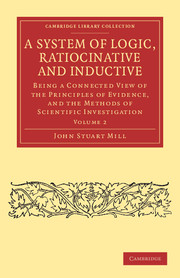
-
Select format
-
- Publisher:
- Cambridge University Press
- Publication date:
- 05 November 2012
- 08 December 2011
- ISBN:
- 9781139149846
- 9781108040891
- Dimensions:
- Weight & Pages:
- Dimensions:
- (216 x 140 mm)
- Weight & Pages:
- 0.81kg, 642 Pages
- Subjects:
- Philosophy: General Interest, Logic, Philosophy Texts, Philosophy
You may already have access via personal or institutional login- Subjects:
- Philosophy: General Interest, Logic, Philosophy Texts, Philosophy
Book description
This two-volume work, first published in 1843, was John Stuart Mill's first major book. It reinvented the modern study of logic and laid the foundations for his later work in the areas of political economy, women's rights and representative government. In clear, systematic prose, Mill (1806–73) disentangles syllogistic logic from its origins in Aristotle and scholasticism and grounds it instead in processes of inductive reasoning. An important attempt at integrating empiricism within a more general theory of human knowledge, the work constitutes essential reading for anyone seeking a full understanding of Mill's thought. Continuing the discussion of induction, Volume 2 concludes with Book VI, 'On the Logic of the Moral Sciences', in which Mill applies empirical reasoning to human behaviour. A crucial early formulation of his thinking regarding free will and necessity, this book establishes the centrality of 'the social science' to Mill's philosophy.
Contents
Metrics
Full text views
Full text views help Loading metrics...
Loading metrics...
* Views captured on Cambridge Core between #date#. This data will be updated every 24 hours.
Usage data cannot currently be displayed.
Accessibility standard: Unknown
Why this information is here
This section outlines the accessibility features of this content - including support for screen readers, full keyboard navigation and high-contrast display options. This may not be relevant for you.
Accessibility Information
Accessibility compliance for the PDF of this book is currently unknown and may be updated in the future.


